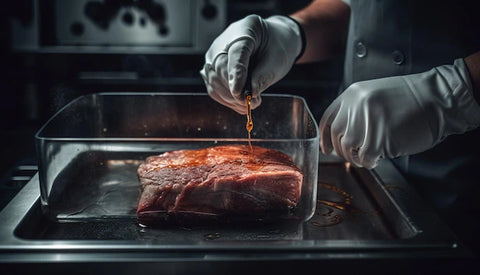Is lab-grown meat safe to eat?

Is Lab-Grown Meat Safe to Eat?
In recent years, the food industry has witnessed a paradigm shift, with Is lab-grown meat safe to eat? becoming a pivotal question for consumers, nutritionists, and environmentalists alike. As the global population burgeons and the demand for protein sources surges, the quest for sustainable, ethical, and health-conscious alternatives to traditional meat has never been more pressing. Enter the world of lab-grown meat, also known as cultured or cell-based meat.
Understanding Lab-Grown Meat
To address the question, Is lab-grown meat safe to eat?, one must first comprehend the intricacies of its production. Lab-grown meat is cultivated from animal cells, without the need to raise and slaughter animals. This process begins with the extraction of muscle tissue from an animal. From this tissue, myosatellite cells – responsible for repairing and regenerating muscle tissue – are isolated. These cells are then placed in a culture medium, rich in essential nutrients, where they proliferate and differentiate into muscle fibers, culminating in muscle tissue – the primary component of meat.
Is lab-grown meat safe to eat?

Safety Concerns and Considerations
The safety of any food product, be it traditional or novel, hinges on various factors, including its method of production, the presence of contaminants, and its nutritional profile.
Contamination Risks: Traditional meat production is fraught with contamination risks, from bacteria like E. coli and Salmonella to parasites. Lab-grown meat, cultivated in sterile environments, ostensibly reduces these risks. However, the culture medium, if not properly sterilized, could introduce contaminants.
Nutritional Equivalence: Preliminary studies suggest that lab-grown meat possesses a nutritional profile similar to its traditional counterpart. However, the culture medium can be adjusted to enhance or reduce certain nutrients, offering potential health benefits.
Chemical Additives: The production of lab-grown meat might necessitate the use of antibiotics, growth factors, and other chemicals. While these are used to optimize the growth environment, their residues, if any, in the final product could be a safety concern.
Allergenicity: Novel foods sometimes pose allergenic risks. While no evidence currently suggests that lab-grown meat is allergenic, comprehensive testing is imperative.
Regulatory Oversight and Approval
Given the nascent nature of the lab-grown meat industry, regulatory frameworks are still in development. In the United States, the Food and Drug Administration (FDA) and the United States Department of Agriculture (USDA) jointly oversee the production and labeling of lab-grown meat, ensuring it meets stringent safety standards.
Environmental and Ethical Implications
While not directly related to safety, the environmental and ethical implications of lab-grown meat are noteworthy. Traditional meat production is resource-intensive, contributing significantly to greenhouse gas emissions, deforestation, and water consumption. Lab-grown meat, in contrast, promises a reduction in environmental degradation. Ethically, it offers a solution to concerns over animal welfare in the meat industry.
Consumer Perception and Acceptance
The ultimate litmus test for lab-grown meat's safety and viability lies in consumer acceptance. While many laud it as the future of sustainable meat production, others express apprehension over its 'unnatural' origins. Transparent communication regarding its production, benefits, and safety is crucial in shaping public perception.

Conclusion
In addressing the question, Is lab-grown meat safe to eat?, one must consider a confluence of factors, from production methods and nutritional profiles to regulatory oversight and consumer perception. While current evidence suggests that lab-grown meat is safe, continuous research, rigorous testing, and transparent communication are paramount. As with any novel food product, informed consumer choice, underpinned by comprehensive scientific research, is the keystone to its success and safety.
